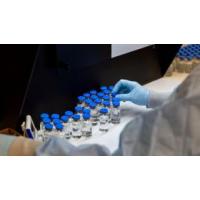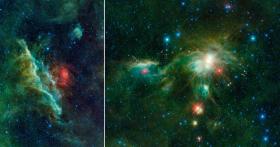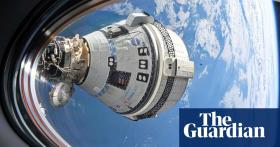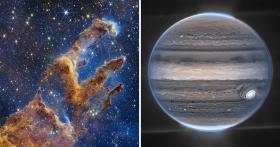- Showing:
- All Topics
Science | Science & Technology
Science & Technology | Science
The Final Images from NASA's Burned-Up NEOWISE Space Telescope
The NEOWISE space telescope is no more, having burned up in Earth's atmosphere. Scientists shared never-before-seen photos from the mission.
Science & Technology | Science
Nasa to say when astronauts ‘stuck’ in orbit will return – but still unsure how
Sunita Williams and Butch Wilmore expected to be in space for days but issues with Boeing’s Starliner spacecraft mean they may not be back until 2025
Science & Technology | Science
The 10 Best James Webb Space Telescope Photos (So Far)
The James Webb Space Telescope has turned two years old. To celebrate the occasion, here are its 10 best space photos so far.
Science & Technology | Science
James Webb Space Telescope spots neutron star hiding in supernova wreckage
Using the James Webb Space Telescope, astronomers spotted a neutron star in Supernova 1987A, the aftermath of a stellar explosion in the Large Magellanic Cloud.
Science & Technology | Science
Small moonquakes caused by Apollo lunar lander module, study finds
The Apollo 17 lunar lander module left behind by US astronauts on the moon’s surface could be causing moonquakes, or small tremors, a new study revealed.
Science & Technology | Science
Physicists discover what lies beyond a black hole's event horizon
Gravity exists in three dimensions within a black hole's geometry, whereas particle physics resides on its surface in two dimensions.
Science & Technology | Science
What are fast radio bursts? | Space
Fast radio bursts — fleeting blasts of energy that are brighter than entire galaxies — remain mysterious. Here's what we know (and don't know) about FRBs.
Science & Technology | Science
Scientists X-ray a Single Atom for the First Time
It took quantum tunneling and a particle accelerator to get the job done
Science & Technology | Science
Relive SpaceX's explosive 1st Starship test flight in these incredible launch photos
Starship may not have reached space, but it put on quite a show.
Science & Technology | Science
Green comet flaunts its tail in dazzling deep space photo
A new image from astrophotographer Miguel Claro shows a close-up view of comet C/2022 E3 (ZTF) on Jan. 22, 2023 immersed in a colorful starfield.
Science & Technology | Science
Why landing a spaceship on the moon is still so challenging
NASA aims to soon return astronauts to the moon. Yet landing people on the lunar surface still remains a hugely ambitious feat.
Science & Technology | Science
Scientists at NASA claim that warp drive is possible
Of many remarkable events shown in Star Trek, warp drive was one of the many futuristic ideas that caught the attention of many people.
Science & Technology | Science
SpaceX still on track to launch Crew-5 astronaut mission for NASA Wednesday
But three minor issues must be resolved first.
Science & Technology | Science
Saturn's rings finally explained after over 400 years
Since the time of Galileo, Saturn's rings have remained an unexplained mystery. A new idea may have finally solved the longstanding puzzle.
Science & Technology | Science
NASA gets Voyager 1 talking again — and discovers a new mystery
14.6 billion miles from one another, NASA engineers have found and fixed a computer glitch that had caused Voyager 1 to transmit garbled telemetry data since May.
Science & Technology | Science
An AI Just Independently Discovered Alternate Physics
Grab any physics textbook and you'll find formula after formula describing how things wobble, fly, swerve and stop. The formulas describe actions we can observe, but behind each could be sets of factors that aren't immediately obvious.
Science & Technology | Science
Why is gravity so weak? The answer may lie in the very nature of space-time
The answer to the question "why is gravity so weak?" may lie in the very nature of space-time
Science & Technology | Science
James Webb Space Telescope's stunning 'Phantom Galaxy' picture looks like a wormhole
A fresh image based on brand-new deep-space data appears to show a wormhole spinning before our very eyes.
Science & Technology | Science
Comparing Hubble to James Webb: The Difference in Detail is Astounding
Comparing the observations of James Webb and Hubble of the same area of space shows just how much more resolution Webb brings to the table.
Science & Technology | Science
New Study Reveals Devastating Effect on Astronaut Bones From Living in Space
Astronauts lose decades' worth of bone mass in space that many do not recover even after a year back on Earth, researchers said Thursday, warning that it could be a "big concern" for future missions to Mars.
Science & Technology | Science
Astronomers are detecting exoplanets using a technique predicted by Einstein
Microlensing works when light from a background star is bent around the mass of an exoplanet, making the background star brighter for a short time.
Science & Technology | Science
NASA’s new powerful space telescope gets hit by larger than expected micrometeoroid
NASA’s James Webb Space Telescope was hit by a relatively large micrometeoroid at the end of May, which caused detectable damage to one of the observatory’s gold-coated primary mirrors.
Science & Technology | Science
Astronomers capture first image of black hole at center of Milky Way
The image of Sagittarius A* offers an unprecedented look at the extreme object driving the evolution of our galaxy.
Science & Technology | Science
Starlink: SpaceX's satellite internet project
Is Starlink a grand innovation or a menace?
Science & Technology | Science
What's up with this weird green rock on Mars? Perseverance rover is trying to find out.
NASA's Perseverance rover is studying a strange rock on Mars as it waits for its companion helicopter to attempt its first flight.
Science & Technology | Science
Listen to the first-ever recording of a NASA rover driving on Mars
NASA has released the first-ever recording of a rover driving across the surface of Mars, and it sounds unlike any vehicle you've heard before.
Science & Technology | Science
NASA Curiosity rover celebrates 3,000th day on Mars with stunning panorama of planet
The glorious new image captures the 96-mile-wide Gale Crater and part of Mount Sharp, its central mountain.
Science & Technology | Science
Drug Reverses Age-Related Cognitive Decline Within Days - Neuroscience News
Short-term exposure to an experimental drug reverses age-related memory decline and cognitive deficits in mice. The drug, ISRIB, has previously shown beneficial effects in treating memory loss associated with TBI and other neurological disorders.
Science & Technology | Science
Record-setting asteroid zoomed past Earth — missing by just 240 miles, NASA announces
An asteroid known as 2020 VT4 flew 240 miles away from Earth last week, setting a record for the closest to fly past Earth without hitting it, NASA said.
Science & Technology | Science
Four astronauts poised to make history as SpaceX's 'Resilience' preps for Sunday launch
'Resilience' will break free of the shackles of gravity and shepherd four astronauts to the ISS for the first ever operational commercial crew mission.
Science & Technology | Science
What did NASA discover on the Moon, and what is it so excited to tell us?
NASA has something very exciting to tell us about the Moon, so it's holding a conference call on Monday, October 26th. The discovery was made using NASA's flying observatory SOPHIA. Audio of the call will be streamed live on NASA's website for everyone to
Science & Technology | Science
A NASA spacecraft is poised to snag the largest sample of rocks from an asteroid ever
On October 19th, NASA’s OSIRIS-REx spacecraft will attempt to grab a large sample of rocks from an asteroid named Bennu, with the goal of returning the material back to Earth in 2023.
Science & Technology | Science
Why Doesn't the Earth Have a Bunch of Mini Moons? | WIRED
To answer this question, let's take a look at something called the Three-Body Problem.
Science & Technology | Science
Scientists May Have Found a Material for Building on Mars | WIRED
Using simple chemistry, the organic polymer chitin can be transformed into a viable substance for creating tools and habitats on the Red Planet.
Science & Technology | Science
Quantum physicists say time travelers don't have to worry about the butterfly effect
What if I told you all your favorite time-travel films and books were actually created by big tech in order to wrest control of the time-travel industry from the proletariat? Think about it. Back to the Future, The Terminator, The Time Machine, all of the
Science & Technology | Science
You Can Get up Close to This Coronavirus—It's Made of Glass | WIRED
But maybe not too close. Luke Jerram's glass statues won't make you sick, but they could still take your eye out.
Science & Technology | Science
NASA’s New Horizons probe helped measure the distance to a potentially habitable system
NASA's New Horizons probe was able to help measure the distance between two stars and our home system thanks to its distant location. The probe's images of the stars were compared with images of those same stars shot from Earth, and researchers calculated
Science & Technology | Science
Spies Can Eavesdrop by Watching a Light Bulb's Vibrations
The so-called lamphone technique allows for real-time listening in on a room that's hundreds of feet away.
Science & Technology | Science
Large trial yields strongest evidence yet that antiviral drug can help COVID-19 patients | Science
Remdesivir sped recovery of patients by several days, although it's "not a home run."
Science & Technology | Science
Cooped Up at Home? Help Scientists Spot Penguins from Space or Seek Out Galaxies - Scientific American
Scientific American is the essential guide to the most awe-inspiring advances in science and technology, explaining how they change our understanding of the world and shape our lives.
Science & Technology | Science
Scientists Are Starting to Take Warp Drives Seriously, Especially This One Concept
It's hard living in a relativistic Universe, where even the nearest stars are so far away and the speed of light is absolute. It is little wonder then why science fiction franchises routinely employ FTL (Faster-than-Light) as a plot device.
Science & Technology | Science
Voyager 2 shut off its instruments to save power, NASA says - CNN
Voyager 2 was only expected to last for five years, but it's still operating 42 years after launch.
Science & Technology | Science
Is there a wormhole hiding at the center of the Milky Way?
We talk to Dejan Stojkovic, professor of cosmology, about whether the black hole at the centre of our Galaxy might actually be a wormhole instead.
Science & Technology | Science
Does Space Really Have A Vacuum Effect Like In The Movies?
We often see ship hull breaches in space movies, but do they accurately depict the vacuum's pull? This question was originally answered on Quora by Robert Frost.
Science & Technology | Science
NASA’s new Moon-bound spacesuit is safer, smarter and much more comfortable | TechCrunch
The next Americans to set foot on the Moon will do so in a brand new spacesuit that's based on, but hugely improved from, the original Apollo suits that last went up there in the '70s. With easier entry, better mobility, and improved communications, these
Science & Technology | Science
Why Is It So Dark in Outer Space?
It's a question scientists have been asking for more than 400 years.
Science & Technology | Science
Black holes might not be black holes at all – BGR
Of all the features of our universe, black holes might be the most interesting, as well as the most frightening. These ultra-dense spots in space suck in everything around them, and once a black hole has you in its grasp, there's quite literally no escapi
Science & Technology | Science
Study finds the universe might be 2 billion years younger
WASHINGTON (AP) — The universe is looking younger every day, it seems. New calculations suggest the universe could be a couple billion years younger than scientists now estimate, and even...
Science & Technology | Science
Why Soviets Sent Dogs, Not Primates, to Space - The Atlantic
Researchers didn’t know how people would react to weightlessness. So they sent animals first.
Science & Technology | Science
Here’s why everything you thought you knew about gravity is wrong
Unless you think hard about gravity, your brain associates gravity with your relationship to the ground beneath your feet
Science & Technology | Science
These Odd 'Quasiparticles' Could Finally Unmask Dark Matter | Space
Tiny ripples called magnons could lure even a fleeting, lightweight dark matter particle out of hiding.
Science & Technology | Science
Video Shows How Hard It Really Is to Walk on Earth After 6 Months in Space
Going to space is serious business. How serious? Well, let this video from NASA astronaut Drew Feustel tell you.
Science & Technology | Science
Climate change: 'Magic bullet' carbon solution takes big step
New CO2 removal technology gains significant investment from fossil fuel companies, but greens have doubts.
Science & Technology | Science
NASA Mars rover Opportunity, resilient Red Planet explorer, officially dead
The robotic trailblazer's mission comes to an end after more than 14 years on Mars. Goodnight, Oppy.
Science & Technology | Science
Apollo astronaut thinks sending humans to Mars is ‘almost ridiculous’
Mars is the hottest topic in the space science world these days, with new rovers, orbiters, and landers finding out new and exciting things about the Red Planet with startling regularity. Multiple …
Science & Technology | Science
Astronomers have found a new crop of moons around Jupiter, and one of them is a weirdo - The Verge
Ten more moons have been confirmed to orbit around Jupiter, bringing the planet’s total known satellite count to 79. That’s the highest number of moons of any planet in the Solar System.
Science & Technology | Science
We tracked scientific discoveries from five years ago to see if they held up
We still don't have male birth control.
Science & Technology | Science
Scientists Detect Mysterious Radio Signals From Deep Space | HuffPost
Strange bursts are coming from 3 billion light years away.
Science & Technology | Science
The Next Solar Eclipse: Eclipse Maps for the Next 50 Years | Time.com
We've listed every total solar eclipse for the next 50 years, after the one on August 21, with maps showing each eclipse's projected path
Science & Technology | Science
Scientists Have Reversed Brain Damage in a 2-Year-Old Girl Who Drowned in a Swimming Pool
Researchers in the US have reported what they believe is a first-of-its-kind reversal of brain damage, after treating a drowned and resuscitated toddler with a combination of oxygen therapies.
Science & Technology | Science
Jupiter’s stunning Great Red Spot, seen like never before
NASA's Juno probe just swooped past the biggest storm in our solar system.
Science & Technology | Science
Mars' version of Niagara Falls is pretty intense
NASA's Mars Reconnaissance Orbiter snapped a new photo of what could be evidence of a 'lava fall' on Mars.
Science & Technology | Science
NASA Rocket Launch Will Create Blue-Green and Red Clouds on Sunday
As long as the weather holds—the launch has been postponed four times already.
Science & Technology | Science
Why Do We Have Blood Types?
When my parents informed me that my blood type was A+, I felt a strange sense of pride. If A+ was the top grade in school, then surely A+ was also the most excellent of blood types – a biological mark of distinction.
Science & Technology | Science
SpaceX to fly two space tourists around the moon in 2018
Elon Musk said two tourists will travel around the moon in 2018 with SpaceX.
Science & Technology | Science
The Universe Is as Spooky as Einstein Thought - The Atlantic
In a brilliant new experiment, physicists have confirmed one of the most mysterious laws of the cosmos.
Science & Technology | Science
What Happened To The Object That Created Our Moon?
What happened to the object that slammed into the Earth to create the Moon? Was it destroyed entirely, or does it linger in one place?
Science & Technology | Science
How to Beat Dengue and Zika: Add a Microbe to Mosquitoes - The Atlantic
After 30 years of development, virus-beating insects are finally being deployed in megacities around the world.
Science & Technology | Science
Deep Space Radiation Caused Heart Problems For Apollo Astronauts - NBC News
The rate of heart disease is greater among the astronauts of the Apollo space program.
Science & Technology | Science
NASA finds that the earth has a new “mini moon”
The quasi-satellite technically orbits around the sun but dances around the earth in the process.
Science & Technology | Science
Where's the Edge of the Universe?
The universe is expanding, but what's it expanding into? Nothing! Astrophysicist Paul Sutter explains this baffling concept, plus how the universe can expand but not have an edge.
Science & Technology | Science
WATCH: How to solve the famous 'grandfather paradox' of time travel - ScienceAlert
What if you went back in time and killed your grandfather? Would you still be born? Or would you have killed yourself?
Science & Technology | Science
This comet looks like a sprinkler twirling through space
The Hubble recorded images as a jet burst off a comet as it made its way around the sun.
Science & Technology | Science
SpaceX announces plan to send mission to Mars in 2018 – Spaceflight Now
Elon Musk’s space transport company — chartered with a long-term goal of colonizing Mars — plans to send the first commercial mission to the red planet as soon as 2018 with assistance from NASA, SpaceX announced Wednesday.
Science & Technology | Science
Bright flash of light marks incredible moment life begins when sperm meets egg
Human life begins in bright flash of light as a sperm meets an egg, scientists have shown for the first time, after capturing the astonishing ‘fireworks’ on film.
Science & Technology | Science
How Fast Does Earth Move Through The Universe? - Forbes
According to relativity, there’s no universal frame of reference. But the Big Bang gave us one anyway.
Science & Technology | Science
New Alzheimer’s treatment fully restores memory function
Australian researchers have come up with a non-invasive ultrasound technology that clears the brain of neurotoxic amyloid plaques - structures that are responsible for memory loss and a decline in cognitive function in Alzheimer’s patients. If a...
Science & Technology | Science
Green Comet Will Pass Near Earth—With a Twin
A rare double comet is buzzing by; here’s how to see it for yourself.
Science & Technology | Science
Photographer snaps thrilling space station image from his backyard - CNET
An amateur astrophotographer takes on the challenge of getting a stunning shot of the ISS and succeeds. It's all in the timing.
Science & Technology | Science
How Scott Kelly's year in space may have changed his body | The Verge
NASA astronaut Scott Kelly is returning to Earth tonight, wrapping up a 340-day-long stay aboard the International Space Station. It's the longest amount of time an American astronaut has lived in...
Science & Technology | Science
The Most Notable Medical Findings of 2015 - The New Yorker
Jerome Groopman selects seven of this year’s most important findings from medicine and biology, including in the areas of C.P.R., cancer, and H.I.V./AIDS.
Science & Technology | Science
40 Years Ago, Earth Beamed Its First Postcard to the Stars – Phenomena: No Place Like Home
Forty years ago, on Nov. 16, 1974, Earth beamed its first postcard to the stars. The message left our home planet on a warm and sticky day in Puerto Rico and has been flying through the galaxy at t…
Science & Technology | Science
Mars Colonies Possible Using Local Materials For 3D Printed Habitats - Our Explorers
This Mars-based habitat uses a pole-like robot with autonomous arms to access raw Martian materials for 3D printing construction - a truly innovative design.
Science & Technology | Science
Over 8,400 images from NASA's Moon missions are now on Flickr in high resolution | The Verge
You've seen images from the Apollo missions before, but you've never seen anything like this. More than 8,400 images from NASA's Moon missions have been uploaded to Flickr at a resolution of 1800...
Science & Technology | Science
NASA to Announce Mars Mystery Solved | NASA
NASA will detail a major science finding from the agency’s ongoing exploration of Mars during a news briefing at 11:30 a.m. EDT on Monday, Sept. 28 at the James Webb Auditorium at NASA Headquarters in Washington. The event will be broadcast live on NASA
Science & Technology | Science
Reboot the Suit: Bring Back Neil Armstrong’s Spacesuit by Smithsonian Institution — Kickstarter
Smithsonian Institution is raising funds for Reboot the Suit: Bring Back Neil Armstrong’s Spacesuit on Kickstarter! A chance for citizens of Earth to conserve, digitize, and display Neil Armstrong's Apollo 11 spacesuit for explorers everywhere.
Science & Technology | Science
Why Pluto Will Remain a Dwarf Planet | Dejan Stojkovic
Ultimately, it does not matter whether Pluto is called a planet or not. People get together, exchange arguments, give new names to the things around them. But Pluto is whatever it is, and has not changed a bit since we demoted it into a dwarf planet.
Science & Technology | Science
Nasa probe's early Pluto data shows dwarf planet larger than anticipated
New Horizon measurements reveal Pluto is roughly two-thirds the size of the moon, and probably holds more ice beneath its surface than previously thought
Science & Technology | Science
NASA selects 4 astronauts to fly first commercial space expeditions | Fox News
NASA has selected four veteran astronauts to lead the way back into orbit from U.S. soil. On Thursday, NASA Administrator Charles Bolden named the four who will fly on capsules built by private companies...
Science & Technology | Science
NASA finds glass on Mars, which could help the hunt for alien life
A NASA spacecraft has discovered glass on the surface of Mars for the first time, a finding that could help in the hunt for past Martian life.
Science & Technology | Science
First visible light detected directly from an exoplanet - physicsworld.com
New method can pick up extremely faint reflected light despite low signal-to-noise ratio
Science & Technology | Science
What would happen if we actually found life on another planet
Since humans first observed other celestial bodies, we have wondered if we were alone in the universe. We’ve looked near, by sending a lander to the Moon and rovers to Mars, and we’re looking far, sending satellites on missions outside our solar system and analyzing the spectra of planets orbiting other stars in the “goldilocks zone.”
Science & Technology | Science
40 years and counting: the team behind Voyager’s space odyssey | Science | The Guardian
In 1977, Voyager 1 and 2 started their one-way journey across our galaxy, travelling a million miles a day. Jonathan Margolis meets the dedicated team keeping the craft moving
Science & Technology | Science
Rings Like Saturn’s, but Supersized | TIME
Think you've seen big rings in our own solar system? Not even close.
Science & Technology | Science
So they might have found Beagle 2 on Mars … Er, remind me, what was it? | Science | The Guardian
The British explorer sent to the red planet 10 years ago went missing. Now it’s located, but it might not be a happy ending after all
Science & Technology | Science
Every Ship That Has Carried Humans Into Space, In One Chart
Space is big, humans are small, and spacecrafts, well, vary more in size than you might think. Redditor Heaney555 has compiled an a chart, to scale, of every rocket, spacecraft, and space station involved in human spaceflight. And man, Saturn V is huuuuuu
Science & Technology | Science
Scientists Venture Deep Inside Mysterious Siberian Crater And Come Back With Incredible Photos
Scientists are closing in on what caused three massive holes to open up mysteriously in northern Siberia last July. This week a team of Russian researchers roped their way down 34 feet to the bottom of the largest crater and found no evidence of a...
Science & Technology | Science
Out Of This World: The Mysterious Mental Side Effects Of Traveling Into Space
The Virgin Galactic crash made the mechanical risks of space tourism clearer, but the psychological effects of space travel largely remain unknown.
Science & Technology | Science
Mystery of Earth's Water Origin Solved
Ancient meteorites reveal that our planet had plenty of water, right from the start.
Science & Technology | Science
40-Year-Old Russian Engine at Heart of Rocket Investigation
Refurbished Soviet rocket engines involved in the accident will draw the attention of investigators.
Science & Technology | Science
What it took for Elon Musk’s SpaceX to disrupt Boeing, leapfrog NASA, and become a serious space company
At first, the US government thought it was just hiring a space taxi.
Science & Technology | Science
Viewing Guide: Watch Blood Moon During Total Lunar Eclipse on Wednesday
A red-hued lunar eclipse will be visible across most of North America Wednesday morning.
Science & Technology | Science
Mysterious feature on Saturn's moon baffles NASA scientists - The Week
NASA's Cassini spacecraft has discovered a "mysterious feature" on Saturn's moon Titan. Scientists are working to determine, what, exactly, this feature might be.
Science & Technology | Science
NASA is building the largest rocket of all time for a 2018 launch | The Verge
Artist's rendering of NASA's Space Launch System (credit: NASA/MSFC) NASA has worked on some inspiring interplanetary projects in the last few years, but few have been as ambitious as the...
Science & Technology | Science
A Cheap Alternative To Satellites Is Starting To Take Off - Business Insider
Its solar cells, which are mounted on its wings, produce 1kW for every 1kg of panel.
Science & Technology | Science
The First Commercial Jet to Break the Sound Barrier Was Not the Concorde
On this date in 1961, a jet designed for commercial use became the first civilian craft to go supersonic. It wasn't the famous Concorde, which wouldn't break the sound barrier until an October '69 test flight, or the Soviet-built Tupolev Tu-144, but rather a humble DC-8—no. N9604Z, to be specific.
Science & Technology | Science
11 NASA Technologies We Use Every Day - Supercompressor.com
The Apollo missions were not only impressive for the fact that, you know, we succeeded in putting a man on the Moon, but also because the push to reach it kick-started a prolific era of innovation. It hasn’t yet come to a halt as we continue to reap the benefits of the groundbreaking technology and advanced materials necessary for man’s most audacious endeavors.
Science & Technology | Science
10 Things You Didn't Know About the First Moon Landing
And no, “It was fake!” is not one of them.
Science & Technology | Science
Video: Modern Day Earthrise in HD, as Seen by the Japanese Lunar Orbiter
Forget sunrises... what we need to see more of on Instagram and our Facebook newsfeeds is Earthrises. Of course, they're a bit harder to capture, but spect
Science & Technology | Science
Do People Only Use 10% of Their Brains?
In a 2013 poll, 65% of Americans thought this statement was true. It isn't. Where'd that number come from?
Science & Technology | Science
Recently revived ISEE-3 probe can’t fire engines, can’t change orbit
Solar probe will likely remain consigned to its lonely heliocentric orbit forever.
Science & Technology | Science
After a 'Year' on Mars, What's Next for Curiosity?
It takes Mars almost twice as long as Earth to rotate around the Sun.
Tuesday marks 687 days — one full Martian year — since NASA's Curiosity rover touched down on the Red Planet's surface.
Science & Technology | Science
Waves Discovered on Saturn’s Moon Titan?
Surfers rejoice! Fresh waves are still out there to conquer—on Saturn’s moon Titan. There, astronomers report a first sighting of waves rolling on an alien sea.
Science & Technology | Science
Deep Underground, Oceans Of Water May Be Trapped In A Crystal 'Sponge'
Scientists have discovered evidence of a vast reservoir of water, maybe three times the volume of all the world's oceans, hiding up to 400 miles beneath the Earth's surface.
Science & Technology | Science
Here's NASA's New Design for a Warp Drive Ship
In 2010, NASA physicist Harold White revealed that he and a team were working on a design for a faster-than-light ship. Now he's collaborated with an artist to create a new, more realistic design of what such a ship might actually look like.
Science & Technology | Science
NASA successfully uses laser to transfer video from the space station to Earth
A 22 MB video transferred in 3.5 seconds, compared to the more than 10 minutes it takes with traditional equipment.
Science & Technology | Science
Astronomers Discover the "Mega Earth," an Entirely New Type of Planet
Meet the "Mega Earth." Described today by astronomers from the Harvard-Smithsonian Center for Astrophysics, this ancient rocky world weighs 17 times as much as Earth — which is a big surprise considering that rocky, solid planets aren't supposed to get that huge.
Science & Technology | Science
After Decades Of Silent Wandering, NASA Probe Phones Home
You might call it the ultimate long shot — a group of space enthusiasts trying to reestablish contact with a wayward satellite launched in 1978. Figuratively speaking, it's been off the radar for decades.
Science & Technology | Science
We've Finally Found Our Sun's Long-Lost Sister
For the first time ever, astronomers have identified a star that emerged from the same cloud of dust and gas as our own. Intriguingly, there's a
Science & Technology | Science
New Generation Flying Cars Will Take Off Vertically
Flying cars have long been the unofficial signpost that will mark our entrance into The Future. Now, it appears, that key moment could be soon approaching.
Science & Technology | Science
The Flying Car That Could Expedite Your Morning Commute - D-brief | DiscoverMagazine.com
Researchers from MIT are developing a versatile flying car that could makes the dream of flying to work more realistic.
Science & Technology | Science
Scientists grow self-healing muscles which could replace real ones - Telegraph
Researchers at Duke University create muscles in a laboratory which could be used to repair injuries
Science & Technology | Science
Star Trek type translator hits the market this month
The device is called Sigmo, it’s a small square that can be work on a chain around the neck.
Science & Technology | Science
This pill could give your brain the learning powers of a 7-year-old - The Week
A Harvard biologist used it to
Science & Technology | Science
Scientists Recreate Dreams With YouTube Videos
Mind reading used to belong to the realms of sci-fi books and comic strips. But in 2011, a team of scientists from UC Berkeley discovered a way to construct YouTube videos from a viewer’s brain activity.
Science & Technology | Science
Comet ISON's Thanksgiving Sun Encounter: An Observer's Guide
The incoming Comet ISON is now in the home stretch of its long-awaited hairpin loop around the sun on Thanksgiving Day (Nov. 28), making it a great target for amateur astronomers and stargazers. Here are some tips to see the comet.
Science & Technology | Science
NASA - NASA to Chronicle Close Earth Flyby of Asteroid
NASA Television will provide commentary starting at 11 a.m. PST (2 p.m. EST) on Friday, Feb. 15, during the close, but safe, flyby of a small near-Earth asteroid named 2012 DA14.
Science & Technology | Science
The flashing fashion aid that will transform you into a tech whizz - CNN.com
The
Science & Technology | Science
Mars | Seeing Red: 40 Years of Exploration on Mars | TIME.com
Four decades of innovation have dramatically shaped our perceptions of Mars - from the first grainy images to 360-degree panoramas in color. TIME's photo editors roundup the awe-inspiring images from the most outstanding expeditions, including the Mars Curiosity rover.
Science & Technology | Science
Poor communication obscures emergency warnings | Jacqueline Windh | Comment is free | guardian.co.uk
Jacqueline Windh: When a small tsunami struck Canada last weekend, community officials did not understand the information scientists gave them
Science & Technology | Science
If Intelligence Is the Norm, Stupidity Gets More Interesting - NYTimes.com
One researcher wonders if scientists, instead of seeking genes that can account for intelligence, should be trying to find mutations that can erode it.
Science & Technology | Science
Surrounded by Humans, Elephant in South Korea Learns to ‘Speak’ - NYTimes.com
Researchers think that Koshik, who lives at a zoo in South Korea, started imitating human speech out of a need to socialize.
Science & Technology | Science
How Do You Train Astronauts When You Don't Have Any Spaceships?
With the shuttles retired, today’s space explorers are preparing for Russian rockets, private capsules, and uncertain destinations. . Visit Discover Magazine to read this article and other exclusive science and technology news stories.




















































































































































